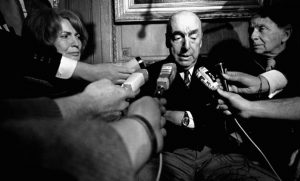We begin the week with a look at the shortlist for this year’s TS Eliot Poetry Prize. We also look at the poet who was almost not awarded a Nobel Prize for Literature over their political views.
TS Eliot Poetry Prize Shortlist
 The shortlist for this years TS Eliot Prize, which carries a cash fund of £25,000, has just been announced.
The shortlist for this years TS Eliot Prize, which carries a cash fund of £25,000, has just been announced.
The prize, which is considered to be the poetry world’s equivalent of the Booker Prize was inaugurated in 1993 in commemoration of the 40th Birthday of the UK Poetry Book Society. It is considered to be one of the most important poetry prizes in the world, and has been referred to as “the Prize most poets want to win.”
TS Eliot was not only a poet but also an essayist, playwright, and literary critic. He was responsible for writing one of the most important bodies of work in the history of British literature. The prize is an annual one that is awarded to the best new collection of poetry that has been published either in Ireland or the UK. The judging committee for the prize is made up of poets who are already well established, something that sets it apart from other poetry prize. The first placed poetry collection is awarded a cash prize of £20,000 and each of the runners up, of which there will be 9 in total will receive £1500 each making it not only the most valuable poetry award in the UK but one of the biggest in the world.
Over the years some very well-known names have been listed as winners of the TS Eliot Prize including Ted Hughes, Seamus Heaney, Ocean Vuong and Anne Carson.
Poet Almost Lost Nobel Prize
 In recent years, the Nobel prize has come under something of a shadow, with numerous scandals taking hold of the prize committee.
In recent years, the Nobel prize has come under something of a shadow, with numerous scandals taking hold of the prize committee.
The prize is certainly no stranger to controversies, and it has recently been revealed that Pablo Neruda came very close to not being awarded the Nobel Prize for Literature in 1971. Neruda had long been considered to be one of the significant forces in the world of 20th century poetry however it was his association with communism and Stalin that almost lost him the most coveted of prizes.
Documents relating to the Academy’s decision in 1971 show praise for Neruda as a poet who had given much to the world but also look at the uncertainty that a number of the members of the Swedish Academy had about the possibility of giving him the prize.
The odes to Stalin that Neruda had written were at the heart of the concerns that they had and there was much debate over whether these works were in line with the original requirements that Alfred Nobel had for the prize: “the person who shall have produced in the field of literature the most outstanding work in an ideal direction.”
Neruda was not the first poet to have caused this type of controversy. The committee have previously debated on the personal and political beliefs of a number of potential candidates including Ezra Pound, Vladimir Nabokov, EM Forster and Samuel Beckett. It is also more than likely that this is an issue they will face again at some point in the not too distant future.


You must register to comment. Log in or Register.